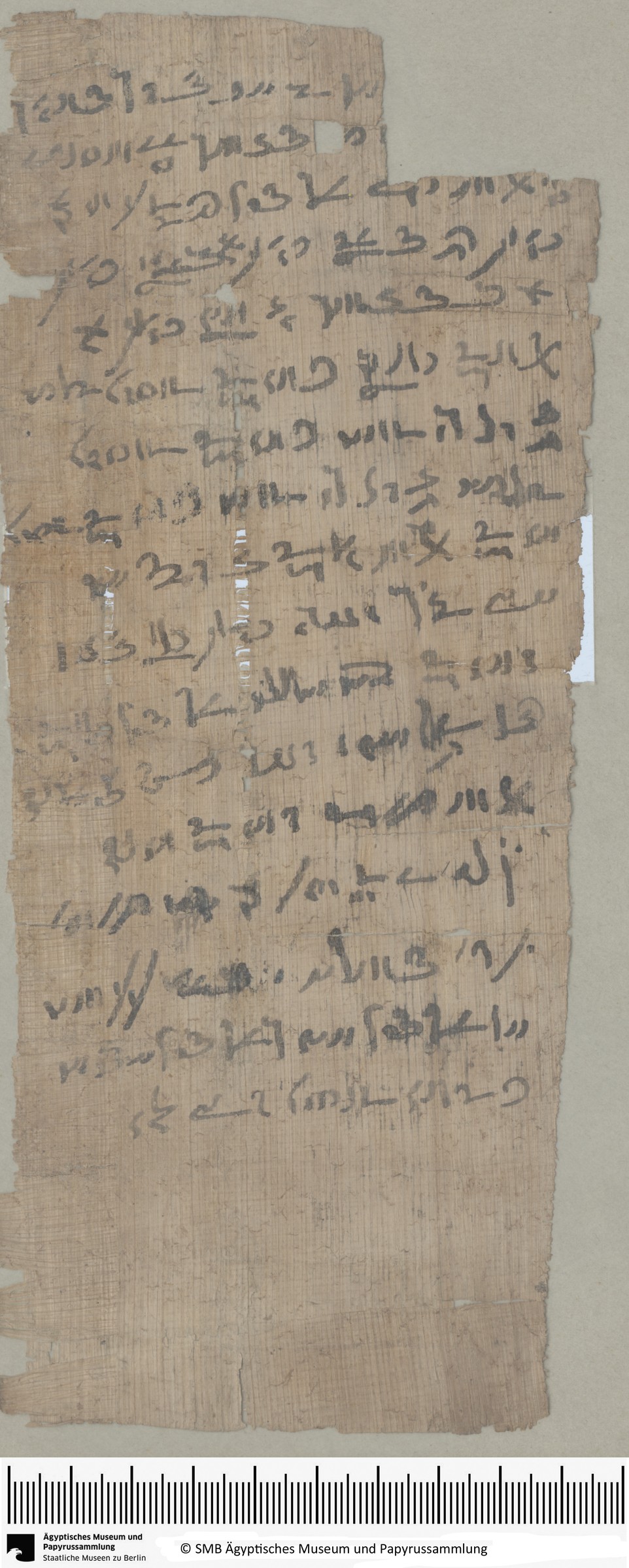Edition
|
1 | | NN sꜣ
Pꜣ-ḏı͗-ꜣs.t pꜣ nty ḏd nꜣ sme |
2 | | Pꜣ-ḏı͗-Wsı͗r-ns-mtr (sꜣ) Bꜥy-ꜥnḫ
|
3 | | dy m-bꜣḥ H̱nm-Nqpls
|
4 | | mtw=f nhm=k mtw=f ḏı͗.t wḏꜣ=k mtw=f |
5 | | ḏı͗.t ḫpr mtr nb ı͗rm=k mtw=f ḏı͗.t |
6 | | nw=n ḥr=k (ı͗w) mn ḏꜥꜣ ẖn |
7 | | ꜥš-sḥn nfr ı͗w mn ḏꜥꜣ
|
8 | | ẖn ꜥš-sḥn nfr mn ḏꜥꜣ |
9 | | (n-)ı͗m=n dy tw=n ı͗r tꜣ wp.t |
10 | | (n) pꜣy=k rn nꜣ md(.t) mtw=f For the use of mtw=f ⲛⲧⲟϥ as a participle see Martin, Demotic Texts (1996), Nr. C23. (r.)wꜣḥ=k ḏd.ṱ=w |
11 | | n=n (r-)dbꜣ pꜣ ḥm-nṯr H̱nm nty ı͗w=n |
12 | | r ı͗r=w ḏr=w tꜣ md(.t) nty ı͗w=k wḫꜣ=s |
13 | | dy hb n=n (n.)ı͗m=s |
14 | | sẖ ḥsb.t 40 Qysr ı͗bd 3 pr.t |
15 | | sw 15 my šn=w pꜣ wḏꜣ Lly
|
16 | | Pꜣ-ḏı͗-H̱nm ı͗rm Pa-H̱nm pꜣ ḫm |
17 | | mn ḏꜥꜣ tꜣy=k šr.t
1 For the use of mtw=f ⲛⲧⲟϥ as a participle see Martin, Demotic Texts (1996), Nr. C23.
|
col. I | |
|
vso I:1 | | ṯꜣy=w For the sequence of the four small lines in the two columns see Martin, Demotic Texts (1996), Nr. C23, contra Zauzich, P. Berl. Eleph. 1 (1978). Both verso columns are written by the same hand, but by another person different from the scribe of the letter. s (r) Ybꜣ
|
vso I:2 | | sw 27 |
col. II | | |
vso II:1 | | (r) ḏı͗.t s (n) Pꜣ-ḏı͗-Wsı͗r-ns-mtr |
vso II:2 | | (sꜣ) Bꜥy-ꜥnḫ
pꜣ ḥm-nṯr
1 For the sequence of the four small lines in the two columns see Martin, Demotic Texts (1996), Nr. C23, contra Zauzich, P. Berl. Eleph. 1 (1978). Both verso columns are written by the same hand, but by another person different from the scribe of the letter.
Translation
|
1 | | [NN, son of] Peteesis is the one, who recites the blessings |
2 | | [(for) Petosor]smetis, (son) of Bienchis, |
3 | | here before Chnoum-Nikephoros. |
4 | | He may rescue you, he may `cause´ you to be saved, and he may |
5 | | cause every right thing to happen to you, and he may cause |
6 | | us to see Reading variant Thesaurus Linguae Aegyptiae: „dein Gesicht“.you without harm in |
7 | | good fortune {harmless |
8 | | in good fortune}. There is no harm |
9 | | with us here. We carry out the work |
10 | | (in) your name. Moreover, the matters of him on which you have spoken |
11 | | to us concerning the priest of Chnoum: We shall |
12 | | carry out all of them. The matter which you will desire |
13 | | here Cf. Den Brinker / Muhs / Vleeming, DBL (2005), 50.: Send to us concerning it! For translation after F. Hoffmann cf. Den Brinker / Muhs / Vleeming, DBL (2005), 50.
|
14 | | Written in the 40th regnal year of Caesar (Augustus), 15th of |
15 | | Phamenoth. Let one ask about the well-being of Lilos, Greek name Λιλως.
|
16 | | (of) Petechnoumis Reading variant Zauzich, P. Berl. Eleph. 1 (1978): „des Sohnes des Petechnoumis“, and (of) Pachnoumis Junior! |
17 | | No disadvantage is there with you daughter |
vso I:1 | | It was taken to Elephantine |
vso I:2 | | at the 27th day, |
vso II:1 | | in order to give it to Petosorsmetis, |
vso II:2 | | (son) of Bienchis, the priest.
1 Reading variant Thesaurus Linguae Aegyptiae: „dein Gesicht“.
2 Cf. Den Brinker / Muhs / Vleeming, DBL (2005), 50.
3 For translation after F. Hoffmann cf. Den Brinker / Muhs / Vleeming, DBL (2005), 50.
4 Greek name Λιλως.
5 Reading variant Zauzich, P. Berl. Eleph. 1 (1978): „des Sohnes des Petechnoumis“
| |
![]() |
| P_15518_R-vorlaeufig |
|
| CC-BY-NC-SA |
|
![]() |
|
